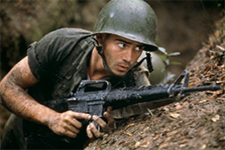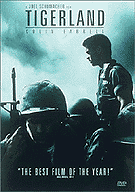Tigerland [DVD]
|

As Vice President Al Gore had to carry the weight of Bill Clinton's scandal-ridden eight-year term as President on his back during his own Presidential campaign, Tigerland, a gritty, moody, Vietnam-era, antiwar boot camp drama, has to carry on its back the disputed cinematic legacy of director Joel Schumacher. Schumacher, whose career has consisted largely of slick, highly polished Hollywood fare with skyrocketing budgets and big stars, works overtime to convince us that he can be a serious artist. Rejected are the pretty Brat-Pack faces that filled St. Elmo's Fire (1985) and The Lost Boys (1987). Shunned are the enormous sets and gaudy special effects of Batman Forever (1995) and Batman & Robin (1997). And, almost gone, but not quite, is the moral righteousness of his John Grisham adaptations, The Client (1994) and A Time to Kill (1996). At the center of Tigerland's narrative is a heroic rebel, an antiwar free spirit named Roland Bozz, who is played by Irish actor Colin Farrell with the kind of irresistible rebellious spirit that has already garnered comparison to Paul Newman's titular character in Cool Hand Luke (1967) and Jack Nicholson's McMurphy in One Flew Over the Cuckoo's Nest (1975). Bozz is a difficult character to describe, yet impossible to dislike. He is the kind of man who would carry a copy of Dalton Trumbo's Johnny Got His Gun with him through boot camp, not because he's reading it, but because he knows it irritates his superiors. Bozz's defiant magnetism draws the other recruits to him, especially Paxton (Matthew Davis), a young man who enlisted of his own free will because of high aspirations and love of country. The officers hate Bozz and his antics, and they do everything they can to suppress him: exercise him, beat him, lock him up in the stockades. Yet, nothing can deter his spirit. One officer correctly notes that Bozz is a born leader who is simply in a time and place where he doesn't want to lead. Yet, as the film makes clear, born leaders will end up leading anyway. Some of the plot developments in Tigerland overshoot their targets, especially as it begins to maneuver Bozz into his place as a heroic martyr. The last third of the film takes place in Tigerland, a training camp constructed in Louisiana to mimic the conditions in Vietnam. The plot sets up a rivalry between Bozz and a recruit named Wilson (Shea Whigham), a psychotic jar-head who has already attempted to kill Bozz once. But, because the year is 1971 and the Army is desperate for fresh soldiers, they simply move Wilson to another squad rather than court-martial him for attempted murder of a fellow soldier. This leads to a fairly predictable climax in which Bozz and Wilson's respective squads face off against each other in a war game with unanticipated life-and-death stakes. Shot in grainy, 16-mm film with mostly hand-held cameras, Tigerland has a jittery, nervous quality that matches the tension of boot camp. Colors are washed out and contrast is stark and glaring, which makes the film look as if it were actually filmed in 1971 and left in a storage room until now. The cinematography is by Matthew Libatique, who also shot Darren Aronofsky's visually striking Requiem for a Dream (2000). On its surface, Tigerland is all mud and guts, angry Army sergeants barking obscenities, grunts sloshing through the Louisiana muck, tempers rising and humanity sinking. It is a crude, documentary-like approach to Stanley Kubrick's theme in Full Metal Jacket (1987) about the necessarily dehumanizing process of turning boys into killing machines. Yet, screenwriters Ross Klavan and Michael McGruther take their antiwar stance one step further by suggesting that not only are the boys taught to be killing machines, but to be indiscriminate killing machines. That is, numerous scenes in Tigerland suggest that civilian massacres like My Lai were not the result of loose-cannon American soldiers who couldn't control themselves; rather, the suggestion is that those American soldiers were taught in boot camp to commit such atrocities. There is a disturbing moment when a sergeant tells the recruits that, if they hear a sound in the bushes, they should fire until whatever is in the bushes is dead, whether it be man, woman, or child. When a recruit bravely (or stupidly, depending on your point view) asks the sergeant, "Like My Lai?," he is punished. In another sequence, an officer gleefully demonstrates how to attach electrodes to the enemy's testicles in order to torture information out of him. In these moments, Tigerland is starkly effective, if a bit too blunt in its obviousness. It's not telling us anything we didn't know before: war is hell, boot camp is dehumanizing, and the Vietnam war was a tragic mistake. Yet, the young, mostly unknown actors who populate the film bring their characters to life so well, and Schumacher captures the edgy horror of basic training in such harsh, unforgettable terms, that the film works despite its going over well-tread territory.
©2000, 2001 James Kendrick |
|||||||||||||||||||||||||||||||||||||||||||||
Overall Rating:



 (3.5)
(3.5)
Subscribe and Follow
Get a daily dose of Africa Leader news through our daily email, its complimentary and keeps you fully up to date with world and business news as well.
News RELEASES
Publish news of your business, community or sports group, personnel appointments, major event and more by submitting a news release to Africa Leader.
More Information
